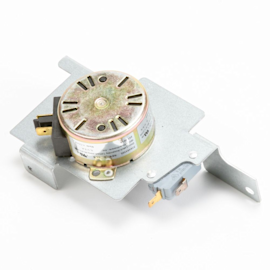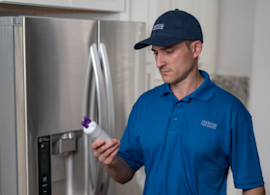- Kenmore refrigerator water filters
- Whirlpool refrigerator water filters
- Samsung refrigerator water filters
- GE refrigerator water filters
- LG refrigerator water filters
- Frigidaire refrigerator water filters
- KitchenAid refrigerator water filters
- Maytag refrigerator water filters
- Kenmore Elite refrigerator water filters
- Estate refrigerator water filters
- GE Profile refrigerator water filters
- Amana refrigerator water filters
- Bosch refrigerator water filters
- Dacor refrigerator water filters
- Electrolux refrigerator water filters
Kenmore Elite 721 model gas range error codes

These error code explanations help troubleshoot a problem on a Kenmore Elite double oven gas range with a model number that starts with 721. When your range isn't heating, you may see an error code in the display. The control only displays F3, F9 and F19 error codes in the regular operation mode. If you don't see a code during a range malfunction, press Clear, and then press and hold Lower Bake and Lower Broil keys for 3 seconds. If the range has a failure that generated an error code other than ones shown above, you'll see that code appear. After noting the error code, press Lower Stop to clear the display. The error code will likely point you in the direction of the range failure. Find the error code in the chart below and repair the failure.
Repairing some failures that cause Kenmore Elite double oven range error codes will require you to buy replacement parts. Search for your model number to find a complete list of replacement parts for your range.
For repair how-to help, visit the PartsDirect repair help section, which includes repair help for refrigerators, other major appliances, lawn and garden equipment, garage door openers, vacuum cleaners and more.
Error Code
Condition
DIY advice
F1 or F2
Defective upper oven temperature sensor
Check/Repair
Unplug the range and measure the resistance of the upper oven temperature sensor. You should measure 1,090 ohms at room temperature (77 degrees F). If resistance is off by more than 100 ohms, replace the upper oven temperature sensor.
Possible parts
Upper oven temperature sensor
F3
Stuck key
Check/Repair
Unplug the range and check the ribbon wire harness connection between the control panel and the oven control board. Reconnect the ribbon wire if loose or replace the wire if damaged. If the ribbon wire connection is okay, unplug the ribbon wire harness and reassemble the range. Plug the range in to restore power. If the F3 code appears after powering up the range, replace the oven control board because the board detects a stuck key with the ribbon wire unplugged. If the F3 doesn't appear, replace the control panel.
Possible parts
Control panel, oven control board
F4 or F5
Defective lower oven temperature sensor
Check/Repair
Unplug the range and measure the resistance of the lower oven temperature sensor. You should measure 1,090 ohms at room temperature (77 degrees F). If resistance is off by more than 100 ohms, replace the lower oven temperature sensor.
Possible parts
Lower oven temperature sensor
F6
Upper oven too hot
Check/Repair
The control senses upper oven temperature above 650 degrees F in bake or broil modes. Unplug the range. If the code appears when the oven is at room temperature, measure the resistance of the upper oven temperature sensor. You should measure 1,090 ohms at room temperature (77 degrees F). If resistance is off by more than 100 ohms, replace the upper oven temperature sensor. If the oven is overheating when the code appears, then you'll likely need to replace the oven control board because a stuck relay on the control board is causing the overheating.
Possible parts
Upper oven temperature sensor, oven control board
F9
Upper oven not heating
Check/Repair
Check the gas supply. Turn on a surface burner to see whether the range is getting gas. If the burner isn't getting gas, open the range gas supply valve. If the surface burner gets gas (which indicates that the range gas supply is okay), then the upper oven bake igniter could be weak. See if the bake igniter glows when you start the upper oven bake mode. The upper oven igniter should heat until it's white-hot to ignite the gas from the oven burner. The igniter is wired in series with the safety gas valve. The gas valve won't open unless it detects the igniter is hot enough to light the burner gas. If the upper oven igniter glows but doesn't heat enough to open the gas valve, unplug the range and replace the igniter. If the upper oven igniter doesn't glow, unplug the range and check the wire harness connections on the upper oven bake igniter and upper oven gas valve. Reconnect any loose wires and repair any broken wires. Next, check the resistance of the bake burner igniter using a multimeter. You should measure between 45 and 400 ohms through the igniter. Replace the igniter if you measure infinite resistance. If the igniter is okay, check the resistance through the gas valve. You should measure 1 to 3 ohms of resistance through the gas valve for the upper bake burner. Replace the gas valve if you measure infinite resistance. Check the wire harness connections for the upper oven on the oven control board. Reconnect any loose wires and repair any broken wires. Unplug the CN02 and CN03 wire harness connectors from the control board and check the resistance through the yellow wire on CN02 and white wire on CN03. You should measure 45 to 400 ohms of resistance. If you measure infinite resistance, then the circuit has a broken wire. Trace the wiring from the control board through the igniter and gas valve. Repair the broken wire. If you measured 45 to 400 ohms of resistance through the wires, check the resistance of the upper oven temperature sensor. You should measure near 1,090 ohms at room temperature (77 degrees). If resistance is off by more than 100 ohms, replace the upper oven temperature sensor. If the temperature sensor resistance is okay, replace the oven control board because it isn't sending current to the igniter.
Possible parts
Upper oven bake igniter, upper oven bake burner gas valve, wire harness, upper oven temperature sensor, oven control board
F10
Upper oven door lock failure
Check/Repair
Unplug the range and check the wire harness connections between the upper oven door lock motor and the relay control board. Reconnect any loose wires and repair any broken wires. Check the wire harness connections between the door lock switches and the oven control board. Reconnect any loose wires and repair any broken wires. Measure the resistance of the upper oven door lock motor using a multimeter. You should measure about 2,600 ohms. Replace the door lock assembly if you measure infinite resistance.
Possible parts
Upper oven door lock
F16
Lower oven too hot
Check/Repair
The control senses lower oven temperature above 650 degrees F in bake or broil modes. Unplug the range. If the code appears when the oven is at room temperature (77 degrees F), measure the resistance of the lower oven temperature sensor. You should measure 1,090 ohms at room temperature. If resistance is off by more than 100 ohms, replace the lower oven temperature sensor. If the oven is overheating when the code appears, then you'll likely need to replace the oven control board because a stuck relay on the control board is causing the overheating.
Possible parts
Lower oven temperature sensor, oven control board
F19
Lower oven not heating
Check/Repair
Check the gas supply. Turn on a surface burner see whether the range is getting gas. If the burner isn't getting gas, open the range gas supply valve. If the surface burner gets gas (an indication that the range gas supply is okay), then the lower oven bake igniter could be weak. See if the bake igniter glows when you start the lower oven bake mode. The lower oven igniter should heat until it's white-hot to ignite the gas from the oven burner. The igniter is wired in series with the safety gas valve. The gas valve won't open unless it detects the igniter is hot enough to light the burner gas. If the lower oven igniter glows but doesn't heat enough to open the gas valve, unplug the range and replace the igniter. If the lower oven igniter doesn't glow, unplug the range and check the wire harness connections on the lower oven bake igniter and lower oven gas valve. Reconnect any loose wires and repair any broken wires. Next, check the resistance of the bake burner igniter using a multimeter. You should measure between 45 and 400 ohms through the igniter. Replace the igniter if you measure infinite resistance. If the igniter is okay, check the resistance through the gas valve. You should measure 1 to 3 ohms of resistance through the gas valve for the lower bake burner. Replace the gas valve if you measure infinite resistance. Check the wire harness connections for the lower oven on the oven control board. Reconnect any loose wires and repair any broken wires. Unplug the CN02 and CN03 wire harness connectors from the control board and check the resistance through the yellow wire on CN02 and white wire on CN03. You should measure 45 to 400 ohms of resistance.. If you measure infinite resistance, then the circuit has a broken wire. Trace the wiring from the control board through the igniter and gas valve. Repair the broken wire. If you measured 45 to 400 ohms through the wires, check the resistance of the lower oven temperature sensor. You should measure near 1,090 ohms at room temperature (77 degrees). If resistance is off by more than 100 ohms, replace the lower oven temperature sensor. If the temperature sensor resistance is okay, replace the oven control board because it's not sending current to the igniter.
Possible parts
Lower oven bake igniter, lower oven bake burner gas valve, wire harness, lower oven temperature sensor, oven control board
F20
Lower oven door lock failure
Check/Repair
Unplug the range and check the wire harness connections between the lower oven door lock motor and the relay control board. Reconnect any loose wires and repair any broken wires. Check the wire harness connections between the door lock switches and the oven control board. Reconnect any loose wires and repair any broken wires. Measure the resistance of the lower oven door lock motor using a multimeter. You should measure about 2,600 ohms. Replace the door lock assembly if you measure infinite resistance.
Possible parts
Lower oven door lock
Most common symptoms to help you fix your ranges
Choose a symptom to see related range repairs.
Main causes: broken oven door lock assembly, wiring failure, electronic control board problem…
Main causes: faulty temperature sensor, electronic control board problem, control thermostat failure, weak burner ignite…
Main causes: power supply problem, control thermostat or electronic control board failure, broken element, bad burner ig…
Main causes: food splatters, spilling food on the oven door, allowing liquid to drip through oven door vent when cleanin…
Main causes: broken broiler element, weak or broken broil burner igniter, control system failure, faulty temperature sen…
Main causes: bad bake element, broken burner igniter, control system failure, blown thermal fuse, faulty temperature sen…
Main causes: power supply failure, blown thermal fuse, bad relay control board, damaged terminal block, wiring failure…
Most common repair guides to help fix your ranges
These step-by-step repair guides will help you safely fix what’s broken on your range.

How to replace a range oven door switch
The oven door switch detects whether the oven door is closed and helps control the oven light. Replace the switch if it …
Repair difficulty
Time required
30 minutes or less

How to replace a range oven door lock assembly
Oven door not locking? You can replace the lock assembly in less than 30 minutes. Here's how.…
Repair difficulty
Time required
15 minutes or less
Effective articles & videos to help repair your ranges
Use the advice and tips in these articles and videos to get the most out of your range.

Learn how to clean and maintain your stove to keep it in top shape.…

Learn about all the convenient features on our Sears PartsDirect website that make your parts purchases easier.…

Get answers to frequently asked questions about Sears and Sears PartsDirect.…